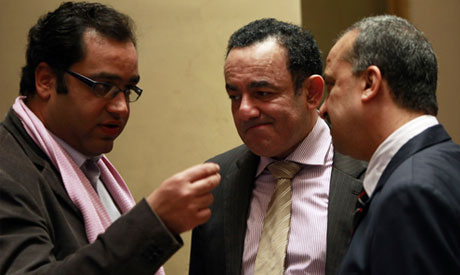
Ziad al-Elaimy (L), Member of Parliament (MP) from the Egyptian Social Democratic Party, speaks with Muslim Brotherhood MP Dr. Mohammed El Beltagy (R) and independent MP Amr al-Shobky before a parliament session in Cairo (Photo: AP)
Egyptian parliamentary parties are set to meet with Egypt's de facto leader Field Marshall Tantawi Sunday, in order to reach an agreement on the method of forming the constituent assembly.
The assembly tasked with writing Egypt's constitution has faced significant problems since electing its members late last March.
Within days of the official membership list being announced, there was a mass walkout of members from the liberal and leftist parties, independent prominent figures and representatives of the unions and syndicates as well as Egypt's main Islamic authority, Al-Azhar, and the Coptic Church.
All objected to the Islamist majority in the assembly and the method used to chose its members, which saw 50 people elected from parliament and 50 non-parliamentarians. Many added that it did not reflect the diversity of Egyptian society.
The Islamists represented more than 65 per cent of the assembly's 100 members, with the Muslim Brotherhood and the Salafist Nour Party winning the largest proportions of seats.
However, the biggest blow to the ill-fated assembly came when the Administrative Court suspended it on 10 April, after ruling in favour of a recent lawsuit questioning the constitutionality of its formation.
A number of prominent lawyers filed the lawsuit against the parliament, challenging the process of forming the assembly, arguing that parliamentarians cannot elect themselves according to a 1994 Supreme Constitutional Court ruling.
Following the court's decision, the constitution-drafting body ceased its sessions and negotiations began between the ruling military council and parliamentary political parties with the aim of agreeing on a new process by which its members are chosen.
The main sticking point between the political parties and the authorities revolves around the percentage of parliamentarians in the constituent assembly.
The position of the Muslim Brotherhood and its political arm the Freedom and Justice Party (FJP) remains ambiguous due to the contradicting statements from its members.
FJP MP Sobhi Salah, who is on the parliamentary legislative committee, revealed that the party would accept the decision to have all the members of the assembly chosen from outside Parliament.
Nevertheless, sources from inside the Brotherhood revealed to Al-Shorouk newspaper Tuesday, that the Islamist group will suggest that the leaders of the parliamentary committees should be represented in the assembly.
There have been other conflicting statements from the Islamist group surrounding the drafting of the constitution.
Following a Thursday 29 March statement from the Supreme Council of the Armed Forces (SCAF) recommending that the Al-Azhar and Democratic Coalition documents be used as constitutional guidelines, the FJP parliamentary block announced its refusal of the enforcement of any document on the assembly. Including, the Islamist group added, the Al-Azhar Document.
This is despite the fact that the Al-Azhar penned statement was widely accepted last June by all political parties including the Brotherhood. In addition, earlier this month FJP MP Saad El-Husseini described the very same document as a good framework for drafting the constitution.
The sidelining of its guidelines in March sparked the decision by Al-Azhar to withdraw its representative from the constituent assembly, in protest, the official press statement read, "At attempts by some to marginalise its role in Egypt."
The Salafist Nour Party, for its part, has not rejected the idea of sourcing the constituent assembly members from outside Parliament. Bassam Razaqa, a member of the Nour Party higher committee, confirmed in an interview with Youm7 newspaper Tuesday, that the ultra-conservative Islamist group was open to the idea.
The Salafist Al-Fadila Party, in agreement with Razaqa, also issued a statement on Tuesday announcing that it supported the proposal.
According to recent sources from within Parliament that spoke to the media, there is a suggestion that the assembly include 17 members from the People’s Assembly as well as the parliamentary speakers from both the lower and upper houses. This would make the total number of parliamentarians in the constitutional-building body, 19.
MP Mustafa Al-Naggarof the Adl party told Ahram Online, Wednesday, that there would be a series of meetings amongst the parliamentary forces in the upcoming days.
“There will be a meeting Wednesday for the parliamentary committees followed by a Thursday morning meeting with the liberal parties, then a final meeting between all the parliamentary parties,” Al-Naggar explained, adding that these discussions are key, as they precede the final talks between the parties’ leaders and Field Marshall Tantawi on Sunday.
Al-Naggar confirmed that there were two suggestions currently being discussed. One is to have all the members of the constituent assembly chosen from outside of Parliament, while the second, which was presented by the liberal Wafd Party, proposes including representatives from all the parties that won seats in Parliament.
On Wednesday night Saad El-Katatni , the speaker of the People Assembly ordered the legislative committee to hold hearing sessions for anyone who would like to suggest guidelines for drafting the constitution stressing that the hearing sessions should include all sectors of the Egyptian society.
In a meeting with Tantawi, the political parties were asked to draft the constitution before the presidential elections, which start on 23 May.
This request was criticised by many, who saw it as a way to either delay the coming elections, and therefore extend military rule, or to ensure the SCAF maintain their influence over the formation of the constituent assembly and the drafting of the constitution.
Both accusations have since been denied by members of the SCAF.
However, it is not yet clear how the ruling military council will persuade different political parties to agree on an accepted exit from the current crisis.
Short link: